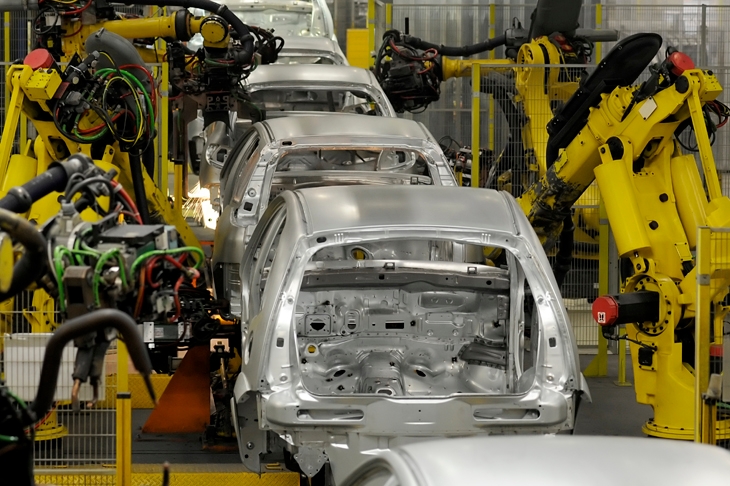Business investment in the UK declined in all four quarters of 2018 to complete a year-on-year dive of 2.4 per cent, according to the ONS. These are the worst capital spending figures since the 2008 crisis, and you’ll guess where the Bank of England places the blame: weaker global growth hasn’t helped but the ‘UK-specific factor’ is ‘a growing portion of [companies] putting new capital investment on hold until there is greater clarity around Brexit’.
Amid reports that factories are focused on stockpiling components ‘at the fastest rate on record’, no one expects investment for the first half of 2019 to look stronger. Jürgen Maier, who runs the UK factories of the German industrial giant Siemens, wrote last week that ‘I personally can no longer defend the action of our parliament when reporting to my managing board, making it hard to win support for finely balanced investment decisions that in the end have an impact on UK jobs, innovation and the competitiveness of our activities here’.
Scaremongering? No, the statistics reflect large numbers of real business decisions. Self-fulfilling pessimism? Possibly, but we’ll never know whether the economic outcomes ahead are the result of Brexit itself, or the negative and fearful attitudes of business towards it, or the way politicians made a pig’s ear of it, or the way the world changed around it; and won’t know what would have transpired if we’d never had the bloody referendum.
But what we can see from the ONS report is the pattern of actual investment — and that, I’m afraid, is even more worrying. In a nutshell, we’ve been investing more in non-residential buildings (from warehouses to office blocks) but less in ‘ICT equipment and other machinery’ and ‘intellectual property products’, which means software, R&D and factory robotics, in which we already trail behind the rest of the G7. It’s a pattern that partially explains the twin supposed mysteries of UK performance: our flatlining productivity, and the high levels of employment from which we otherwise draw consolation. But to quote Jürgen Maier again, it’s a trend that, combined with a bad Brexit, will ‘cripple our hopes of competing in the fourth industrial revolution’.
Born-again entrepreneurs
Siemens’ UK HQ happens to be in Manchester, where I was glad to find contrary evidence last week that all is far from lost on the innovation front, at the Northern Tech Awards, presented in rock’n’roll style by the investment bank GP Bullhound. Here were 100 high-growth companies, ranging from the self-explanatory (-Parcel2Go, Pharmacy2U) to the baffling: I glazed over at ‘the intersection of Big Data and the Cloud’. Among winners with plainer purposes were Sheffield-based Twinkl, which sells online teaching materials for schools around the world, and Leeds-based Crisp Thinking, which provides rapid responses to adverse social media activity for companies and brands, again worldwide.
But most interesting were the conversations about people rather than equipment and algorithms. Almost all of these ventures are in a phase which demands rapid recruitment of talent. ‘Who here finds that easy?’ asked a speaker: a single hand was raised in the crowd. One software wizard enthused about hiring Syrian refugees with firsts in electronic engineering for his outpost in low-cost Kuala Lumpur. Another lamented the difficulty of getting a day’s work out of Britain’s smartphone-addicted ‘Generation Z’ (born after 1995) with their short attention spans and constant need for praise and validation. The simpler answer, until now, has been to recruit highly educated and motivated kids from the EU’s Baltic fringes, but Brexit has choked that pipeline.
We’ve always been a nation of ideas and we could emerge from Brexit as a nation of born-again, outward-bound entrepreneurs. But if we don’t nurture the skills and invest in the tech, it’s hard to see how we’re going to build a new wave of world-beating businesses on our own shores.
End of cycle?
In Los Angeles last autumn, I found my friends all favouring Lyft as a friendlier ride-sharing service than Uber. Now operating in 300 cities, Lyft has also just beaten its larger, more aggressive rival to the stock market. The shares briefly jumped from their $72 issue price to $88, giving a valuation that matched old-world giants such as Fiat Chrysler and fuelling talk of mega-IPOs to come for the likes of Airbnb and Uber itself. But the price had sunk to $69 by Monday as investors absorbed the fact that Lyft lost $911 million in 2018 on just $2.2 billion of revenues and has no idea when it might break into profit. In truth, the float is an opportunist move by venture capital funds that were Lyft’s earlier backers — and more likely an end-of-cycle indicator than a harbinger for investors of joy to come.
Calm down, sir
I once described myself as ‘standing by like Jeeves’ to advise the Sports Direct tycoon Mike Ashley on how to take his image upmarket (I suggested a spot of shooting with the late Duke of Westminster) and garner less hostile coverage. He was in need of my help again this week: ‘Anything but Ashley!’ was one headline on a report of his tussle for control of the doomed Debenhams chain against US hedge funds on one side and Sir Philip Green on the other. At the same time, he was pursuing a hostile £140 million bid for the home shopping group Findel and a possible rescue of the collapsed fashion brand L.K.Bennett, to add to other recent high-street acquisitions.
I’m prepared to believe Ashley’s one-man mission to save British retailing is well meant. It may even be well financed. But he too often gives the impression of thrashing around like a wasp-stung bullock. He really needs to calm down, kick back and consolidate. As Jeeves said when Bertie became agitated on the subject of trousers: ‘The mood will pass, sir.’







Comments